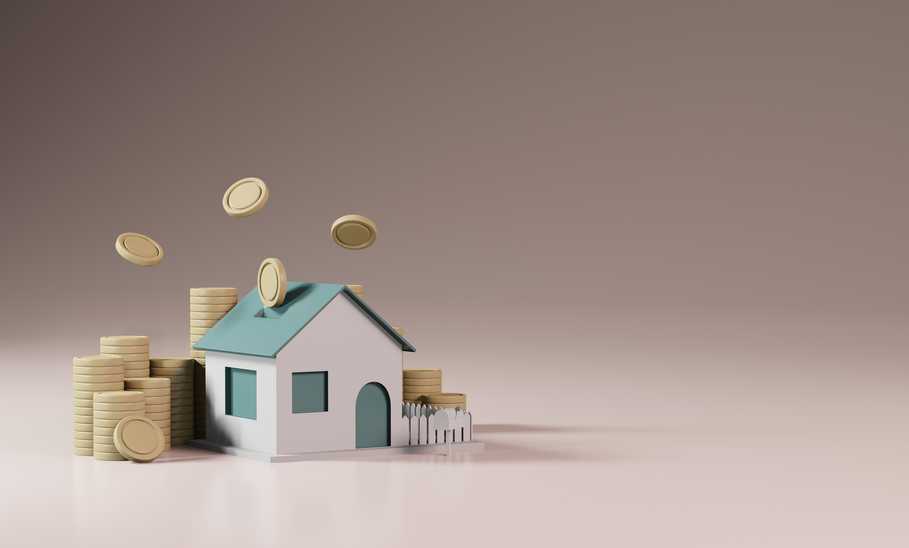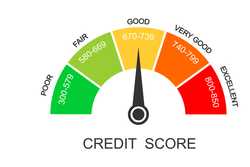What is the Minimum Credit Score Needed to Buy a House?

Our evaluations and opinions are not influenced by our advertising relationships, but we may earn a commission from our partners’ links. This content is created by TIME Stamped, under TIME’s direction and produced in accordance with TIME’s editorial guidelines and overseen by TIME’s editorial staff. Learn more about it.
A home is likely the most expensive purchase you’ll ever make, and most people don’t have sufficient savings to pay for a house in full. This is why the majority of buyers need to get a mortgage in order to buy a home. Unfortunately, not everyone will be able to get approval for a mortgage. One of the factors that can affect whether your mortgage application is approved is your credit score. Read on to learn what credit score you need to buy a house.
How loan type affects the credit score you need to buy a house
Lenders use several metrics to determine whether or not to approve you for a home loan. These include the amount of income you earn, your debt-to-income (DTI) ratio, and your credit score. The minimum credit scores required for the different types of mortgage loans are explained in detail below.
Conventional loans—mortgages that are not backed by a government agency—are the most common type of mortgage. To qualify for a conventional loan, you’ll need a credit score of at least 620, though some lenders may choose to approve conventional mortgage applications only for borrowers with credit scores of 680 and up. If your down payment is less than 20%, you’ll probably also have to buy private mortgage insurance (PMI) as added protection for the lender in the event you default on the loan.
An FHA loan is a type of mortgage that’s insured by the Federal Housing Administration. This insurance means there’s less risk for the lender, so it can approve mortgages for applicants with credit scores of 580 and up (as long as you can put down at least 3.5% of the purchase price). If you have a more significant down payment (at least 10% of the purchase price), lenders may approve an FHA loan for an applicant with a credit score as low as 500.
VA loans are insured by the U.S. Department of Veterans Affairs, though the VA does not actually do the lending. A VA loan is an option if you’re a current or former member of the United States military (or in some cases the spouse of a service member). With a VA loan you can have a low down payment (even no down payment, in some instances), a low interest rate, and no requirement to buy PMI. Although there is no minimum credit score requirement for VA loan approval, many lenders will only approve them for borrowers who have a score of at least 580—in some cases 620).
USDA loans are insured by the U.S. Department of Agriculture. They’re intended to help low- or medium-income buyers purchase houses in rural areas as a way to build the population there. Like VA loans, USDA loans don’t have an official minimum credit score requirement. However, many lenders will approve USDA mortgages only for applicants with credit scores of 580 and up.
Jumbo loans are intended for buyers who want to purchase a home that exceeds the conforming loan limits (CLLs) set by the Federal Housing Finance Agency (FHFA). For 2023 that means homes that cost more than $726,200 in most areas of the country (the figure goes up to $1,089,300 in certain high-cost areas). If you need a jumbo loan to purchase a home, you’ll likely need a credit score of at least 680. Some lenders may make that 700).
Although your credit score isn’t the only piece of data lenders use to determine your mortgage rate, it does play a significant role. A “good” or an “excellent” credit score signals to lenders that you are responsible with money and pay your bills on time. Lenders assume this means you’d be on time with your monthly mortgage payments. This can translate to a lower interest rate.
On the flip side, a borrower with a “poor” or “fair” credit score is seen as riskier for lenders, as they’re more likely to miss payments or default on a loan entirely. It can be difficult for borrowers with lower credit scores to find a lender to approve a mortgage for them. If they do find one they’ll probably have a much higher interest rate, which means they’ll pay more interest over the life of the loan.
It is certainly possible to find a lender to approve a mortgage if you have a bad credit score, particularly if you opt for an FHA or a USDA loan. However, you’ll probably have a lot more trouble finding a lender than you would if your score were “good” or “excellent.” Additionally, even if you do find a lender to approve your mortgage application, you’ll likely be offered a much higher mortgage rate than if your credit score were higher. As noted earlier, that means you’ll have higher monthly payments and have paid more interest by the time the loan term ends.
If your credit score is bad, consider working on improving it before applying for a mortgage. Depending on your current score, even a slight improvement that pushes you from the “fair” to the “good” range can significantly lower your mortgage rate.
If you want to work on your credit score before you start looking to buy a house, here are some simple steps to follow.
Keeping a close eye on your credit can help boost your credit score. This is because you can catch any discrepancies and address them early, before they have a serious effect on your credit. Additionally, monitoring your credit helps you see the improvements you’re making in real time, which can motivate you to keep going. A credit monitoring service such as myFICO or Experian can keep you on track while you prepare to buy a home.
Making payments on time will have the biggest effect on your credit score. Create a list of all the monthly and quarterly bills you have and when they’re due. From there you can either set reminders on your phone to pay bills or set up automatic bill pay so you don’t have to give it another thought.
A slim credit file can translate to a lower credit score. Ideally, you should have a mixture of installment loans (such as car or student loans) and revolving credit (such as credit cards or other lines of credit) in your credit file.
If your file is relatively new, and you find it hard to qualify for traditional credit cards, consider applying for a secured credit card and using it to boost your credit. Lenders generally don’t run credit checks for secure credit card applications, but you’ll need to put down a security deposit (which often translates to the card limit). Some recommended options are as follows.
| Card name | Annual fee | Variable APR | Security deposit |
|---|---|---|---|
card_name | annual_fees | reg_apr,reg_apr_type | $200 - $3,000 |
card_name | annual_fees | reg_apr,reg_apr_type | $49 - $1,000 |
OpenSky® Secured Visa® Credit Card | $35 | 24.64% (variable) | $200 - $3,000 |
Your credit utilization is the amount of available credit you are currently using. For example, if you have a total of $10,000 of credit available over two or three cards and are carrying an overall balance of $6,000, your credit utilization will be 60%. Ideally, your credit utilization should be 30% or less, so it’s a good idea to start paying down your debt to decrease that percentage before applying for a mortgage.
Your DTI ratio is calculated by dividing your total monthly debt payments by your monthly gross (pretax) income, multiplied by 100. This number tells lenders how well you manage loan payments and whether you are living within your means. A high DTI ratio can be a red flag for lenders and could result in them denying your mortgage application.
To decrease your DTI ratio, you’ll need either to reduce your debt or increase your income. This is where a budget can come in handy. It allows you to better understand where your monthly income goes and determine how you can make adjustments to help pay off debt. Additionally, you can consider asking your boss for a raise, applying for higher-paying jobs, or starting a side hustle to make some extra money that you can put toward your debts.
If your credit score is already “good” or “excellent,” you’re likely in a good place to apply for a mortgage. If your score is lower than that, it may be better to wait and work on improving it before house hunting. While you may be able to find a mortgage with a lower credit score, you could end up paying thousands more in interest over the life of the loan than you would if you worked on boosting your score before applying for a home loan.
The terms “mortgage” and “home loan” are both used to describe the same financial product: a loan you use to help finance a home purchase. The two terms can be used interchangeably.
It can be hard to get a mortgage with “fair” or “poor” credit, but there are options available if you can’t wait before applying for a loan. The better option is to hold off on buying a home until you’ve improved your credit score.
There’s no one credit score that is needed to buy a $250,000 house. Instead, it will depend on the type of loan for which you apply and the lender’s requirements. You may be able to get an FHA loan with a score as low as 500 if you have a 10% down payment; otherwise, you’ll probably need a score of 580 to 620 at minimum.
The information presented here is created by TIME Stamped and overseen by TIME editorial staff. To learn more, see our About Us page.





